Servants of Christ Proclaim the Truths of Salvation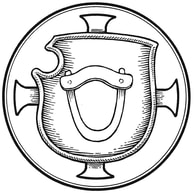
We know almost nothing about St. Matthias compared to Judas. While we know the grisly details of Judas’ death (Acts 1:18–19), we are unsure of Matthias’. After his election, the Bible never mentions him again. He seems to be a forgotten apostle. But what is fame to God? He looks to “he who is humble and contrite in spirit and trembles at my word” (Is. 66:2). Judas trembled, but his contrition was without faith in God’s mercy in Christ. He tried to bear his own sin in the form of a noose. Jesus does not say, “see to it yourself,” (Matt. 27:4) but “come to me, all who labor and are heavy laden, and I will give you rest. Take my yoke upon you...and you will find rest for your souls” (Matt. 11:28–29). Matthias was a witness of Christ’s ministry from John’s baptism to the resurrection (Acts 1:21–22), chosen to proclaim “the kingdom of heaven” (Matt. 10:7) from repentance to redemption and new life. He and countless other forgotten ministers continually announce the truth that no sinner must bear his own yoke, for Christ bears it all and has put sin to death forever in His cross.
1 Comment
Christians Live by Faith in Christ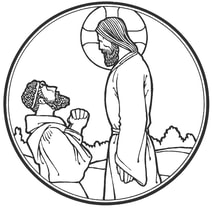
“Cursed is the man who trusts in man,” for all the strength of his flesh is like the grass that fades away (Jer. 17:5). The one who turns away from the Lord may have food and money and laugh for now, but he “shall mourn and weep” in the judgment (Luke 6:24–25). But “the man who trusts in the Lord” is blessed with all that he needs, “like a tree planted by water.” When heat comes, he survives (Jer. 17:7–8). For the Lord has come in the flesh to heal the people of all their diseases, to cleanse their spirits with forgiveness, and to preach the Gospel of the kingdom of God to the poor (Luke 6:18–20). As all of this is by way of His cross, it is solely by faith in the promise of His resurrection that Christians “rejoice” and “leap for joy” (Luke 6:21–23). “If Christ has not been raised,” our faith is in vain and we are most to be pitied (1 Cor. 15:14–19). But, in fact, just as “Christ died for our sins,” so has He also “been raised from the dead” (1 Cor. 15:3, 20).
Jesus Comforts His People By the Gospel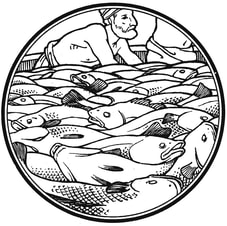
When Isaiah “saw the Lord sitting upon a throne, high and lifted up,” he was overcome with an awareness of his sin and “unclean lips” (Is. 6:1, 5). But the Lord atoned for his sin, took away his guilt and sanctified his lips with “a burning coal” from the altar (Is. 6:6–7). Not only was he rescued from death, but he was called and sent as a prophet of the Lord’s Word (Is. 6:8–9). Similarly, when Simon Peter and his companions “enclosed a large number of fish” at the Word of Jesus, he humbled himself and said, “Depart from me, for I am a sinful man” (Luke 5:4–8). But Jesus comforted Simon, called him to discipleship and declared that he would be “catching men” (Luke 5:10–11). So in the Office of the Ministry, the Church remains the little boat from which Jesus teaches His people (Luke 5:3). Thus are we instructed in the faith, so that we say “Amen” and return thanks with heart, mind, tongue and life. For the preaching of Christ Jesus is a manifestation of the Holy Spirit, by which He builds up His Church on earth (1 Cor. 14:12–19).
Jesus is Lord of All Creation
In Jonah we see ourselves. For Jonah fled from the presence of the Lord (Jonah 1:1–17) even as we sinners turn our backs on God and go our own way. This brings the storm of God’s judgment. But in Jonah we also see Christ. For even as he was in the great fish for three days and three nights, so also Christ Jesus was buried in the depths of death for us and raised on the third day. The Lord of creation, who rules over the wind and the wave (Matt. 8:23–27), saved us from the fury of divine wrath by taking the judgment in His own body. His love is the fulfillment of the Law (Rom. 13:8–10). Though our faith be weak in the face of peril, yet we are kept in safety on the ship of the Church; for the Son of God is with us. Though the whole creation groans with us under the curse, yet by Jesus’ speaking, there is a great calm. For we know that our present sufferings are not worthy to be compared with the glory to be revealed in us (Rom. 8:18–23).
Jesus Came for Gentiles, Too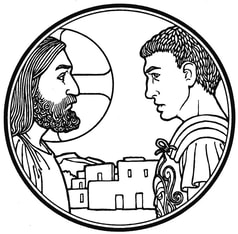
The Gospel of Christ is the power of God to salvation for everyone who believes, for the Jew first and also for the Gentile (Rom. 1:8–17). Even in the Old Testament, the Gentiles were beneficiaries of God’s saving power. Though unimpressed at first with the Word of God, a Syrian commander is persuaded to receive that Word, and in the water he is cleansed and brought to faith in the God of Israel (2 Kings 5:1–15a). Evil is overcome by good (Rom 12:16–21). So also in the New Testament, a Roman centurion demonstrates great and humble faith in the Lord (Matt. 8:1–13). All he needs is the Word of Christ, for he trusts that Jesus’ Word of healing has authority to accomplish what it says. And indeed it does. The centurion’s faith is praised by our Lord above that of any Israelite. For the last shall be first, and the first last. Apart from faith in Christ, there is no salvation—not even for a Jew—but only weeping and gnashing of teeth.
Jesus' First Miracle Reveals God's Glory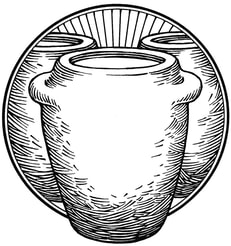
The coming of the Messianic kingdom means the restoration of creation. The sign of this restoration is that “the mountains shall drip sweet wine” (Amos 9:11–15). When the elements of a fallen creation fail and run short at a wedding feast, our Lord Jesus steps in to restore creation and miraculously changes water into an abundance of the very best wine (John 2:1–11). With this sign, Christ manifests His glory. The “back” of God (Ex. 33:12–23) is revealed to those who believe. The hour will come when Jesus will again manifest His glory by taking creation’s curse into His own body to release us from its power. The Bridegroom will give His life for the Bride (Eph. 5:22–32), and from His side will flow water and blood, the holy sacraments by which she is cleansed and made one with Him. Through this sacrificial love of Christ we are enabled to “love one another with brotherly affection . . .” and to “outdo one another in showing honor” (Rom. 12:6–16).
In His Baptism, Jesus Takes His Place with Sinners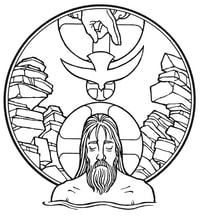
Our Lord Jesus is baptized “to fulfill all righteousness” (Matt. 3:13–17). He partakes of a baptism for sinners in order that He might be our substitute and bear the judgment we deserve. In the water, Jesus trades places with us. Our sin becomes His sin. His righteousness becomes our righteousness. Our glory, therefore, is in “Christ Jesus, who became to us...righteousness and sanctification and redemption” (1 Cor. 1:26–31). Jesus is the “chosen” One sent from the Father to release us from the prison house of sin and death (Is. 42:1–7). Baptized into Christ, we also become the chosen ones, beloved of the Father. We cross the Jordan with Jesus (Joshua 3) through death into the promised land of new life with God.
The Lord God Is Manifested in the Incarnate Son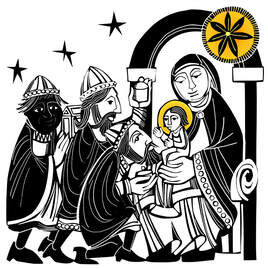
The Feast of the Epiphany centers in the visit of the Magi from the East. In that respect, it is a “Thirteenth Day” of Christmas; and yet, it also marks the beginning of a new liturgical season. While Christmas has focused on the Incarnation of our Lord—that is, on God becoming flesh—the season of Epiphany emphasizes the manifestation or self-revelation of God in that same flesh of Christ. For the Lord Himself has entered our darkness and rises upon us with the brightness of His true light (Is. 60:1–2). He does so chiefly by His Word of the Gospel, which He causes to be preached within His Church on earth—not only to the Jews but also to Gentiles (Eph. 3:8–10). As the Magi were guided by the promises of Holy Scripture to find and worship the Christ Child with His mother in the house (Matt. 2:5–11), so does He call disciples from all nations by the preaching of His Word, to find and worship Him within His Church (Is. 60:3–6). With gold they confess His royalty; with incense, His deity; and with myrrh, His priestly sacrifice (Matt. 2:11).
The Seed of David Comes to His Temple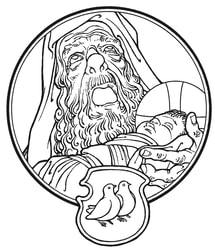
A Rod has come forth from the stem of Jesse (Is. 11:1–5)—the Seed of David whose kingdom shall be established forever (2 Sam. 7:1–16). In the fullness of time, God sent forth His Son Jesus to redeem us from the judgment of the Law (Gal. 4:1–7). Now He is presented in the temple in fulfillment of the Law and revealed to be “a light for revelation to the Gentiles, and for glory to your people Israel” (Luke 2:22–40). Christ has enlightened us in baptism, giving us to be adopted as sons of God and heirs of eternal life. Receiving the Holy Sacrament of His body and blood, we are prepared to depart this world in peace, for our eyes have seen the salvation of God in Him.
Anxious Bondage vs. Confident Trust “You cannot serve God and money” (Matt. 6:24–34), for they require two contrary forms of service. Worry is the worship given to the false god of mammon, an unbelieving anxiousness and focus on the things of this world. Faith is the worship of the true God, a confident trust that He is a loving Father who will care for all of our needs in both body and soul. The widow of Zarephath served God—that is, she believed the word of the Lord spoken by Elijah that the bin of flour would not be used up nor would the jar of oil run dry (1 Kings 17:8–16). He who feeds the birds and clothes the flowers will certainly provide for our daily needs. For He has already provided for our eternal needs, clothing us with Christ’s righteousness in Baptism and feeding us His body and blood for our forgiveness. With such confidence we are liberated from worry and freed to do good with our material resources, especially to those who are of the household of faith (Gal. 5:25–6:10).
|
Archives
February 2019
Categories
All
|
||||||||||||||||||||||||||||||||||||||||||||||||||||||||||||

 RSS Feed
RSS Feed
